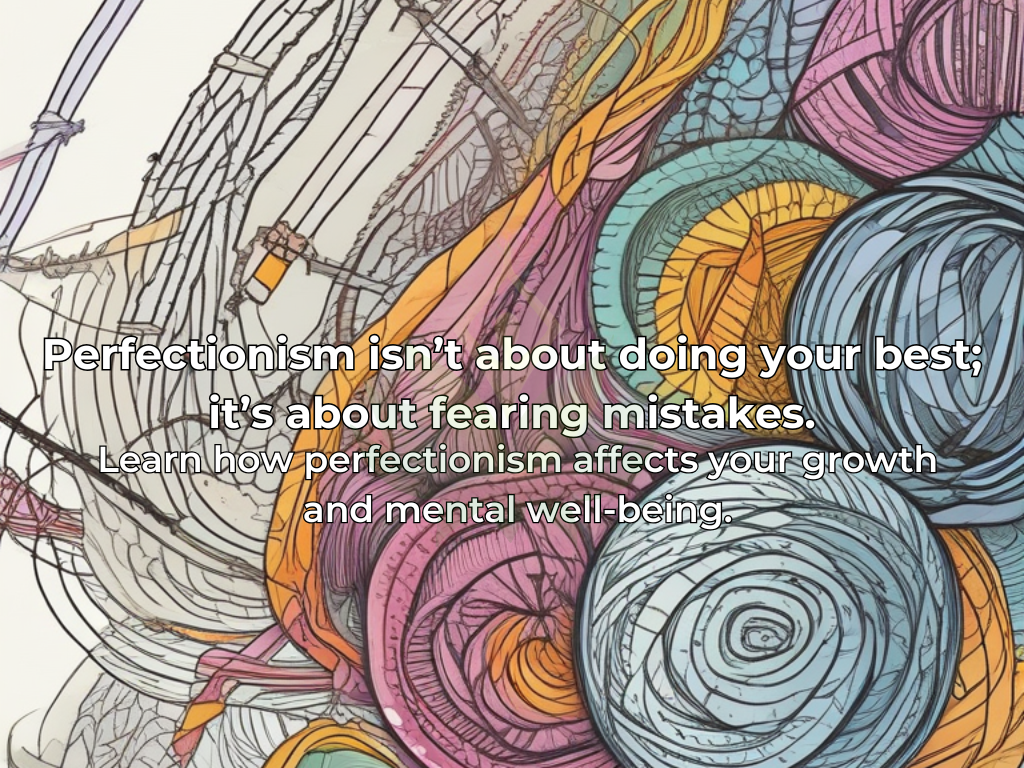Modern life demands metrical judgment based on achievement levels, leading most people to believe perfectionism becomes essential. We establish demanding goals and then surpass them as we work to achieve complete perfection. Beyond appearance, perfectionism functions as a hidden thief that steals peace, joy, and self-acceptance from us.
Actual growth doesn’t come from perfection but from embracing imperfection and allowing ourselves to evolve naturally.
What is Perfectionism, and Why Does It Hold Us Back?

Perfectionism is more than having high standards—it’s an inner pressure to meet unrealistic expectations, often at the cost of our mental and emotional well-being. It’s the fear of not being good enough, the anxiety of making mistakes, and the relentless need to prove ourselves.
If you’ve ever thought, “I’ll be happy when everything is perfect,” it might be time to examine how perfectionism shapes your life.
The Hidden Roots of Perfectionism
Perfectionism rarely originates within us; it often emerges from external influences such as:
- Childhood Experiences: Growing up with conditional love based on achievements.
- Societal Pressures: Social media’s “perfect” images that set unrealistic standards.
- Fear and Control: The need to control outcomes to avoid failure and rejection.
Understanding where perfectionism originates is the essential key to unlocking the door. Acceptance of the self represents the essential foundational step toward freedom, which leads to self-acceptance and personal power.
Signs You Might Be a Perfectionist
Perfectionism shows up in different ways, some more subtle than others. Here are some common signs:
- Procrastination: Delaying tasks out of fear they won’t be “good enough.”
- Overthinking: Constantly analyzing every detail, afraid of making mistakes.
- Fear of Judgment: Concern over others’ opinions of you results in evasion.
- Exhaustion: Burning out due to setting impossibly high standards.
You might need assistance controlling your life if you notice these warning signs about perfectionism being an issue. Recognition of these signs leads to personal empowerment and freedom from the burdens perfectionism places on your life.
The Hidden Costs of Perfectionism
The pursuit of perfection often leads to deeper emotional and physical challenges, including:
Chronic Stress and Anxiety: Mental exhaustion builds up as part of this unending process of self-induced stress.
Low Self-Esteem: When you constantly feel inadequate, it creates harmful opinions about yourself.
Relationship Struggles: When our expectations become unrealistically high, these pressures lead to strained relationships between ourselves and others.
The shift from perfection-seeking involves maintaining high standards through approachable objectives so that one’s development remains stealthy and one’s energy remains intact.
Breaking Free from Perfectionism
Overcoming perfectionism is a journey, and it starts with small, intentional changes:
- Shift Your Perspective: Focus on progress over perfection. You should acknowledge tiny accomplishments along with continuing personal improvement.
- Practice Self-Compassion: Show yourself kindness during moments of unforeseen circumstances.
- Embrace Mindfulness: Stay present while maintaining your ground and drop your desire to control.
- Try EFT Tapping: Emotional Freedom Technique (EFT) helps release limiting beliefs tied to perfectionism.
- Set Realistic Goals: Learn to define success on your terms, not based on external validation.
How the Holistical Method Can Help
The Holistical Method offers a unique, holistic approach to overcoming perfectionism by addressing the mind, body, and spirit together.
Through tools such as:
- EFT Tapping to clear deep-seated perfectionist patterns.
- Mindfulness Practices to cultivate acceptance and presence.
- Energy Healing to align your inner self with your external goals.
This approach allows you to achieve equilibrium by dissolving perfectionistic habits while consistently progressing through understanding your authentic talents, which creates a comprehensive life balance.
Practical Exercises to Overcome Perfectionism
Here are several practical activities you can include in your daily life to begin overcoming perfectionist behaviors:
- Daily Affirmations: Start your day by affirming, “I am enough as I am.” Repeating positive affirmations can reprogram your subconscious mind.
- Journaling: Write down your achievements, no matter how small, and reflect on what you learned rather than what you could have done better.
- Breathing Exercises: Make time for deep breathing practice that will help you tame anxiety produced by perfectionism.
- Gratitude Practice: Downtime planning should include short rest periods that help you relax and think clearly.
Embracing Imperfection and Finding Freedom
True fulfillment comes from progress, not perfection. Accepting yourself as you are—flaws and all—allows you to experience life with more joy, creativity, and authenticity.
So, the next time you feel the urge to strive for perfection, take a deep breath and remind yourself that you are enough.
Ready to Break Free from Perfectionism?

Begin your journey today with the Holistical Method’s self-healing practical tools. Get our free ‘5 Steps to Relieve Stress’ guide to launch your journey toward embracing growth through self-acceptance.
Download Now
https://holisticalmethod.com/wp-content/uploads/2024/12/Stress-Relief-Guide.pdf
Angel Dimitrov. (2025). Holistical Method. https://holisticalmethod.com